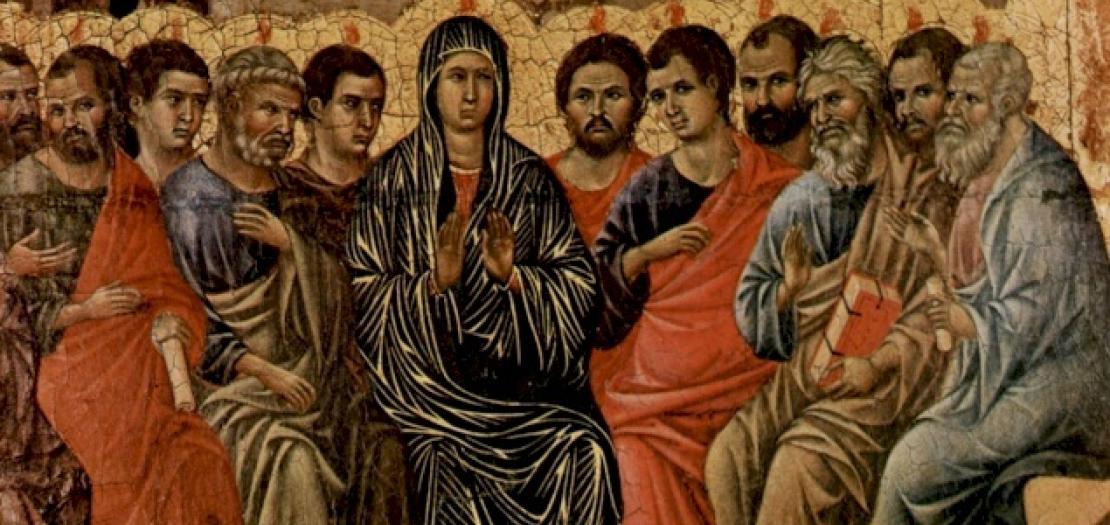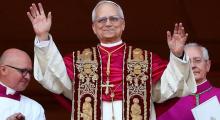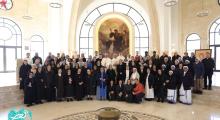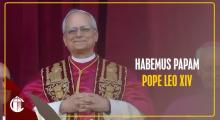Issued by the Catholic Center for Studies and Media - Jordan. Editor-in-chief Fr. Rif'at Bader - موقع أبونا abouna.org

Following is the text of the meditation by Latin Patriarch of Jerusalem His Beatitude Pierbattista Pizzaballa for Pentecost Sunday, Year A, May 28, 2023:
On this feast of Pentecost, we listen to the Gospel passage of John’s Gospel that brings us back to the Easter evening, “On the evening of that first day of the week…” (John 20:19-23): the Risen Jesus visits His disciples locked in the Cenacle, and immediately gives them His Spirit, the new life that He received from the Father. As soon as He receives it, He immediately shares it with His own because that is precisely why He came into the world, just for this reason, went through death, thus fulfilling the Father’s work.
Not only. But at the very moment when the Risen Lord gives His Spirit to His disciples, immediately He sends them on a mission, dispatches them, enables them to be His witnesses. These few verses of John lead us to the heart of the new life, the life of missionaries and witnesses.
There is, at the center of these verses, the gift of the Spirit that makes possible what precedes it and what follows it.
What precedes it is precisely the mission.
If in the Synoptic Gospels much space is reserved to the sending of the disciples on a mission, and how must be carried out is described at length (do not to bring anything for the journey, no bag, no second tunic, no staff, etc…), here all this and, even more, is summed up in a phrase, is summarized in this “as”, “As the Father sent me, so I send you” (John 20:21). John does not feel the need to write anything regarding the conditions of the mission: This as is enough.
The mission of the disciples must be as that of the Son, must have the same attitudes, the same sentiments, the same intentions, the same thinking. And for John, this as can be summed up entirely in a single work of Jesus, the one He placed at the heart of the Last Supper, namely, the washing of feet.
What follows the gift of the Spirit is the invitation by the Risen Lord to go and forgive sins (John 20:23): this is the only content of the mission that the Evangelist John takes great care to record.
We could say that the breath of Jesus which He breathes on His disciples and communicates the Spirit to them is like a new creative gesture, like that when, at the beginning of time, God breathed vital breath into the human being. (cf Gen 2:7)
But here, the life that man receives is the very life of God, the life of the Risen One, able to conquer death and sin. It is a new life, reconciled with God in the death of Christ, a forgiven life and, therefore, capable of forgiving.
The content of the mission cannot be other than this, that of mercy without limit which God revealed on the Cross, for all, because the only way to overcome evil is forgiveness.
For this reason, forgiveness is the great proclamation of the Kingdom: the mission of the disciples, who participate in the unique mission of Christ, can only be the proclamation that God forgives us, that God stands before our evil not by judging us, not by punishing us, but by forgiving us, that is offering a new beginning every time. That is why it is a great proclamation of hope, the only true proclamation of hope.
Because “For God did not send His Son into the world to condemn the world, but so that the world might be saved through him” (John 3:17) and the Church, every believer, is sent for the same purpose, it is sent as Jesus.
And if the place of the forgiveness of Jesus is the Cross, if it is the place of non-judgment, of non-condemnation, then it can only be so for all His disciples. To forgive means, in some way, to climb the cross for the other, to be in the place where evil is curbed, where it is assumed, for the other.
There is no forgiveness that does not pass through here, and there is no Christian witness that does not pass from here. And there is no Christian community, no communion that does not pass from here, from this tricky situation of giving life, as Jesus did for us.
The mission of the Church, her image, will depend in large part on this, on this access of each person to that new life, recreated by the Spirit in the unconditional forgiveness of Christ, and therefore called to share the gift received.
+Pierbattista







